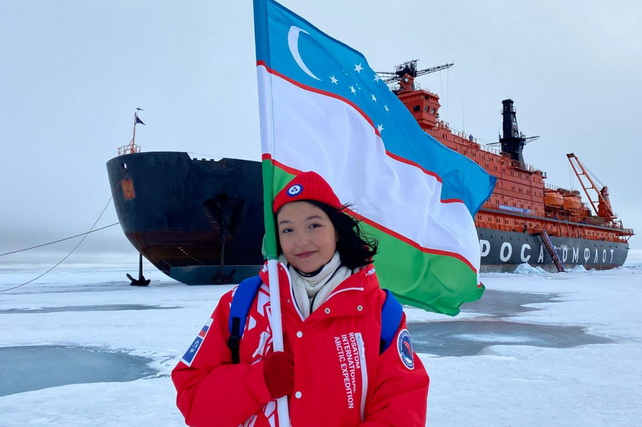
Uzbek Schoolgirl Takes Part in “Icebreaker of Knowledge” Arctic Expedition
Uzbek Schoolgirl Takes Part in “Icebreaker of Knowledge” Arctic Expedition
Tashkent, Uzbekistan (UzDaily.com) — The international Arctic expedition “Icebreaker of Knowledge,” organized by the network of Information Centers for Nuclear Energy with the support of Rosatom State Corporation, has successfully concluded.
Over ten days, 66 talented schoolchildren from 21 countries, including Uzbekistan, not only reached the geographic North Pole but also completed an intensive educational program.
For Uzbekistan, the expedition was a landmark event: Alina Chembayeva, a school student from the country, was among the participants after successfully passing a competitive selection process that involved more than 4,000 applicants.
The educational project “Icebreaker of Knowledge” aims to promote natural sciences and nuclear technologies, identify and support gifted students, develop their talents, and guide their professional orientation.
Since its launch, more than 400 students have taken part in Rosatom’s Arctic expeditions. This year’s journey was held under the “Science to Win” initiative of the Decade of Science and Technology, and also marked the 80th anniversary of Russia’s nuclear industry and the 500th anniversary of the Northern Sea Route.
The expedition combined discovery with education. On board, students attended lectures from leading experts in nuclear physics, composite materials, and ecology, while also learning about the operation of the nuclear icebreaker fleet.
“We had a schedule: breakfast, three or four lectures, lunch, another three or four lectures, dinner, and an evening program. But what I liked most was how approachable the experts were. They joined us in all activities and were always open to conversation.
You could ask any question. For example, when we reached the ice, I noticed it was a rich blue color, while I thought it should be transparent. On board, there was an oceanographer I could simply approach and ask: why is the ice blue?” Alina shared.
Such an environment, where teenagers interact directly with world-class scientists and engineers, provides invaluable experience for their future.
Cultural exchange also played an important role. Alina often spoke to her peers about her homeland, describing Samarkand and Bukhara and inviting them to visit Uzbekistan.
For many, the expedition became a defining step toward choosing a profession. Some resolved to pursue careers in science, others in engineering. For Alina, the trip confirmed her passion for communications. She encouraged other young people to apply for similar projects:
“Don’t be afraid to apply. If you’re rejected, you lose nothing. Give it your all, because this chance comes once in a lifetime. If you let it slip and don’t try your best, you may regret it later. Everything is in your hands.”
Today, “Icebreaker of Knowledge” is seen not only as an educational initiative but also as a platform for international youth dialogue.
“For the second year in a row, we’ve opened the Arctic not only to Russian children but also to students from around the world. Our crew was delighted to show participants the North Pole and polar bears. You have to see the children’s emotions to understand the value of ‘Icebreaker of Knowledge,’” said Ruslan Sasov, captain of the nuclear icebreaker 50 Let Pobedy (“50 Years of Victory”).
Uzbekistan first joined the expedition in 2024, when Shahzoda Yokubova, a graduate of the Tashkent branch of MEPhI, took part as an expert and science popularizer.
For young people, participation in such international projects means not only strengthening global ties in science and education but also finding motivation to pursue research, make breakthroughs, and integrate into the global educational community.